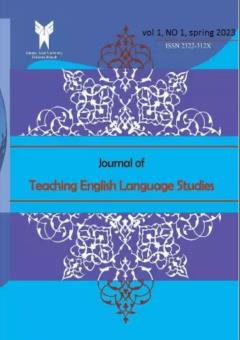IELTS Writing Skills Training and EFL Learners’ Identity Construction: Link to Selves-theory
Subject Areas : Journal of Teaching English Language Studies
Sanaz Farnia
1
![]() ,
Neda Fatehi Rad
2
*
,
Neda Fatehi Rad
2
*
![]() ,
Hassan Shahabi
3
,
Hassan Shahabi
3
![]()
1 - Ph.D. Candidate, Department of English Language, Kerman Branch, Islamic Azad University, Kerman, Iran
2 - Assistant Professor, Department of English Language, Kerman Branch, Islamic Azad University, Kerman, Iran
3 - Assistant Professor, Department of English Language, Kerman Branch, Islamic Azad University, Kerman, Iran
Keywords: IELTS writing skills, Identity construction, EFL context, Selves-theory,
Abstract :
Writing academically which has recently attracted much attention in the field of applied linguistics, is a complex process for many candidates. Among the four language skills, writing is more tied to selves-theory since it needs ideology transfer, the main element of the theory. This paper made an effort to examine the effect of training on IELTS writing skill on Iranian EFL students' construction of the possible selves in the future. In doing so, an experimental study was employed and 90 candidates of both genders were chosen to participate based on cluster sampling method. The instrument of the study was a related questionnaire (Zadshir et al., 2020) which was used to check the expected possible selves of the participants. Descriptive statistics and Multi-Variate Analysis of Variance (MANOVA) were run to analyze data. Findings of the study indicated that expected and responsible selves were stronger than feared selves among the participants after treatment. That is to say, training on IELTS writing skills had a remarkable effect on Iranian EFL students’ construction of the possible selves and the dimensions of the possible selves in the future. Implications of the results for EFL curriculum planners, teachers and learners have been discussed.
Anderson, K. T. (2017). The doctoral gaze: Foreign PhD students’ internal and external academic discourse socialization. Linguistics and Education, 37, 1-10. https://doi.org/10.1016/j.linged.2016.12.001
Abdelal, R. Y. M., Herrera, A. I., & Mcdermott, R. J. (2006). Identity as a variable. Perspectives on Politics, 4(4), 695-711.
Beijaard, D., Meijer, P. C., & Verloop, N. (2004). Reconsidering research on teachers’ professional identity. Teaching and Teacher Education, 20(2), 107-128. https://doi.org/10.1016/j.tate.2003.07.001
Benwell, E., & Stokoe, E. (2006). Discourse and identity. Qualitative Research in Psychology, 4, 261-262.
Berlin, J. (1988). Rhetoric and ideology in writing class. College English, 50 (5), 477-494. https://doi.org/10.2307/377477
Burns, A. (2007). The Cambridge guide to second language teacher education. Cambridge University Press.
Conway, P. F., & Clark, C. M. (2003). The journey inward and outward: A re-examination of Fuller's concerns-based model of teacher development. Teaching and Teacher Education, 19(5), 465-482. https://doi.org/10.1016/S0742-051X(03)00046-5
Crawford, C., & Greaves, E. (2015). Socio-economic, ethnic and gender differences in HE participation. Institute for Fiscal Studies.
Erikson, E. H. (1950). Childhood and society. Norton.
Flores, M. A., & Rosa, C. (2015). Contexts which shape and reshape new teachers’ identities: A multi-perspective study. Teaching and Teacher Education, 22, 219-232.
Hamman, D., Gosselin, K., Romano, J., & Bunuan, R. (2010). Using possible-selves theory to understand the identity development of new teachers. Teaching and teacher education, 26(7), 1349-1361. https://doi.org/10.1016/j.tate.2010.03.005
Hardgrove, A., Esther, R., & McDowell, L. (2015). Possible selves in a precarious labor market: Youth, imagined future and transitions to work in the UK. Geoforum, 60, 163–71. http://dx.doi.org/10.1016/j.geoforum.2015.01.014
Harrison, N. (2018). Using the lens of ‘possible selves’ to explore access to higher education: A new conceptual model for practice, policy, and research. Social Sciences, 7 (209), 1-21. https://doi.org/10.3390/socsci7100209
Landau, M. J., Jesse, B., Lucas, A. & Keefer, C. (2017). On the road: combining possible identities and metaphor to motivate disadvantaged middle-school students. Metaphor and Symbol, 32(4), 276–290. https://doi.org/10.1080/10926488.2017.1384271
Leary, M. R., & Tangney, J. P. (Eds.). (2012). The self as an organizing construct in the behavioural and social sciences. In M. R. Leary & J. P. Tangney (Eds.), Handbook of self and identity (pp. 1–18). The Guilford Press.
Mahendra, A. W. (2020). Constructing Identity: Experiences of Indonesian ESP Teachers in a Language Institute. English Language Teaching Educational Journal, 3(3), 229-240. https://doi.org/10.12928/eltej.v3i3.2560
Mahmoudi-Gahrouei, V., Tavakoli, M., & Hamman, D. (2016). Understanding what is possible across a career: Professional identity development beyond transition to teaching. Asia Pacific Education Review, 17(4), 581–597. https://doi.org/10.1007/s12564-016-9457-2
Markus, H., & Nurius, P. (1986). Possible selves. American Psychologist, 41(9), 954-969. https://doi.org/10.1037/0003-066x.41.9.954
Motallebzadeh, K., & Kazemi, B. (2018). The relationship between EFL teachers’ professional identity and their self-esteem. Cogent Education, 5(1), 144-156. https://doi.org/10.1080/2331186x.2018.1443374
Nazari, M., & Seyri, H. (2021). Covidentity: examining transitions in teacher identity construction from personal to online classes. European Journal of Teacher Education, 1-20. https://doi.org/10.1080/02619768.2021.1920921
O’Sullivan, B. (2018). IELTS (International English Language Testing System). In J. I. Liontas & M. DelliCarpini (Eds.), The TESOL Encyclopedia of English Language Teaching. Wiley Blackwell.
Oyserman, D., & Fryberg, S. (2006). The possible selves of diverse adolescents: Content and function across gender, race and national origin. In C. Dunkel & J. Kerpelman (Eds.), Possible selves: Theory, research, and application (pp. 17–39). Nova Science Publishers.
Oyserman, D., Johnson, E., & James, L. (2011). Seeing the destination but not the path: Effects of socioeconomic disadvantage on school-focused possible self-content and linked behavioral strategies. Self and Identity, 10(4), 474–492. https://doi.org/10.1080/15298868.2010.487651
Parsi, Gh., & Ashraf, H. (2020). The relationship among EFL teachers’ critical thinking, professional identity and teaching experience. Journal of Applied Linguistics and Language Research, 7(1), 144-154.
Riahipour, P., Tavakoli, M., & Eslami Rasekh, A. (2020). Curriculum reform and Iranian EFL teachers' professional identity: A marathon of change. Two Quarterly Journal of English Language Teaching and Learning University of Tabriz, 12(26), 435-463. https://doi.org/10.22034/elt.2021.42087.2294
Simon-Maeda, A. (2004). The complex construction of professional identities: Female EFL educators in Japan speak out. TESOL Quarterly, 38(3), 405–436.
Zadshir, F., Saber, S., & Abolmaali Alhoseini, Kh. (2020). Construction and psychometric analysis of possible selves’ questionnaire in students. Quarterly of Applied Psychology, 14 (4), 391-414. https://doi.org/10.52547/apsy.2021.215393.0

